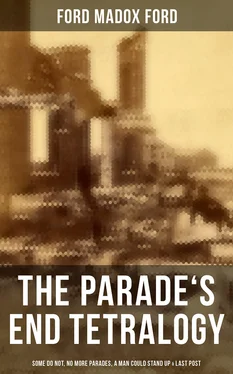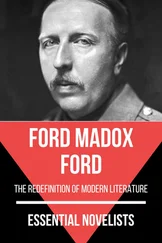Sylvia was saying:
‘Every penny I have is at your disposal . . . ’ when the maid, Hullo Central, marched up to her master and placed a card in his hand. He said:
‘Tell him to wait five minutes in the drawing-room.’ Sylvia said:
‘Who is it?’
Tietjens answered:
‘A man . . . Let’s get this settled. I’ve never thought you corrupted the boy. You tried to teach him to tell white lies. On perfectly straight Papist lines. I have no objection to Papists and no objection to white lies for Papists. You told him once to put a frog in Marchant’s bath. I’ve no objection to a boy putting a frog in his nurse’s bath, as such. But Marchant is an old woman, and the heir to Groby should respect old women always and old family servants in particular . . . It hasn’t, perhaps, struck you that the boy is heir to Groby . . .
Sylvia said:
‘If . . . if your second brother is killed . . . But your eldest brother . . . ’
‘He,’ Tietjens said, ‘has got a French woman near Euston station. He’s lived with her for over fifteen years, of afternoons, when there were no race meetings. She’ll never let him marry and she’s past the child-bearing stage. So there’s no one else . . .
Sylvia said:
‘You mean that I may bring the child up as a Catholic.’ Tietjens said:
‘A Roman Catholic . . . You’ll teach him, please, to use that term before myself if I ever see him again . . .
Sylvia said:
‘Oh, I thank God that He has softened your heart. This will take the curse off this house.’
Tietjens shook his head:
‘I think not,’ he said, ‘off you perhaps. Off Groby very likely. It was, perhaps, time that there should be a Papist owner of Groby again. You’ve read Spelden on sacrilege about Groby? . . . ’
She said:
‘Yes! The first Tietjens who came over with Dutch William, the swine, was pretty bad to the Papist owners . . .
‘He was a tough Dutchman,’ Tietjens said, ‘but let us get on! There’s enough time, but not too much . . . I’ve got this man to see.’
‘Who is he?’ Sylvia asked.
Tietjens was collecting his thoughts.
‘My dear!’ he said. ‘You’ll permit me to call you “my dear”? We’re old enemies enough and we’re talking about the future of our child.’
Sylvia said:
‘You said “our” child, not “the” child . . . ’
Tietjens said with a great deal of concern:
‘You will forgive me for bringing it up. You might prefer to think he was Drake’s child. He can’t be. It would be outside the course of nature . . . I’m as poor as I am because . . . forgive me . . . I’ve spent a great deal of money on tracing the movements of you and Drake before our marriage. And if it’s a relief to you to know . . . ’
‘It is ,’ Sylvia said. ‘I . . . I’ve always been too beastly shy to put the matter before a specialist, or even before mother . . . And we women are so ignorant . . . ’
Tietjens said:
‘I know . . . I know you were too shy even to think about it yourself, hard.’ He went into months and days; then he continued: ‘But it would have made no difference: a child born in wedlock is by law the father’s, and if a man who’s a gentleman suffers the begetting of his child he must, in decency, take the consequences: the woman and the child must come before the man, be he who he may. And worse-begotten children than ours have inherited statelier names. And I loved the little beggar with all my heart and with all my soul from the first minute I saw him. That may be the secret clue, or it may be sheer sentimentality . . . So I fought your influence because it was Papist, while I was a whole man. But I’m not a whole man any more, and the evil eye that is on me might transfer itself to him.’
He stopped and said:
‘For I must to the greenwood go. Alone a broken man . . . But have him well protected against the evil eye . . .
‘Oh, Christopher,’ she said, ‘it’s true I’ve not been a bad woman to the child. And I never will be. And I will keep Marchant with him till she dies. You’ll tell her not to interfere with his religious instruction, and she won’t . . .
Tietjens said with a friendly weariness:
‘That’s right . . . and you’ll have Father . . . Father . . . the priest that was with us for a fortnight before he was born to give him his teachings. He was the best man I ever met and one of the most intelligent. It’s been a great comfort to me to think of the boy as in his hands . . .
Sylvia stood up, her eyes blazing out of a pallid face of stone:
‘Father Consett,’ she said, ‘was hung on the day they shot Casement. They dare not put it into the papers because he was a priest and all the witnesses Ulster witnesses . . . And yet I may not say this is an accursed war.’
Tietjens shook his head with the slow heaviness of an aged man.
‘You may for me . . . ’ he said. ‘You might ring the bell, will you? Don’t go away . . .
He sat with the blue gloom of that enclosed space all over him, lumped heavily in his chair.
‘Spelden on sacrilege,’ he said, ‘may be right after all. You’d say so from the Tietjenses. There’s not been a Tietjens since the first Lord Justice cheated the Papist Loundeses out of Groby, but died of a broken neck or of a broken heart: for all the fifteen thousand acres of good farming land and iron land, and for all the heather on the top of it . . . What’s the quotation: “Be ye something as something and something and ye shall not escape . . . ” What is it?’
‘Calumny!’ Sylvia said. She spoke with intense bitterness . . . ‘Chaste as ice and cold as . . . as you are . . . Tietjens said:
‘Yes! Yes . . . And mind you none of the Tietjens were ever soft. Not one! They had reason for their broken hearts . . . Take my poor father . . .
Sylvia said:
‘ Don’t !’
‘Both my brothers were killed in Indian regiments on the same day and not a mile apart. And my sister in the same week: out at sea, not so far from them . . . Unnoticeable people. But one can be fond of unnoticeable people . . .
Hullo Central was at the door. Tietjens told her to ask Lord Port Scatho to step down . . .
‘You must, of course, know these details,’ Tietjens said, ‘as the mother to my father’s heir . . . My father got the three notifications on the same day. It was enough to break his heart. He only lived a month. I saw him . . . ’
Sylvia screamed piercingly:
‘Stop! stop! stop!’ She clutched at the mantelpiece to hold herself up. ‘Your father died of a broken heart,’ she said, ‘because your brother’s best friend, Ruggles, told him you were a squit who lived on women’s money and had got the daughter of his oldest friend with child . . . ’
Tietjens said:
‘Oh! Ah! Yes! . . . I suspected that. I know it, really. I suppose the poor dear knows better now. Or perhaps he doesn’t . . . It doesn’t matter.’
Читать дальше












